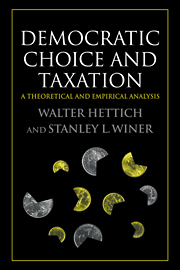Book contents
- Frontmatter
- Contents
- Preface
- 1 Introduction
- PART ONE THEORETICAL FRAMEWORK
- PART TWO COLLECTIVE CHOICE AND THE NORMATIVE ANALYSIS OF TAXATION
- PART THREE APPLIED GENERAL EQUILIBRIUM ANALYSIS
- PART FOUR STATISTICAL ANALYSIS OF TAX STRUCTURE
- 8 Introduction to Statistical Research
- 9 Income Taxation and Special Provisions: Evidence from U.S. States
- 10 Debt and Tariffs: The Evolution of the Canadian Revenue System
- PART FIVE POLITICAL INSTITUTIONS AND TAXATION
- Bibliography
- Name Index
- Subject Index
8 - Introduction to Statistical Research
Published online by Cambridge University Press: 08 October 2009
- Frontmatter
- Contents
- Preface
- 1 Introduction
- PART ONE THEORETICAL FRAMEWORK
- PART TWO COLLECTIVE CHOICE AND THE NORMATIVE ANALYSIS OF TAXATION
- PART THREE APPLIED GENERAL EQUILIBRIUM ANALYSIS
- PART FOUR STATISTICAL ANALYSIS OF TAX STRUCTURE
- 8 Introduction to Statistical Research
- 9 Income Taxation and Special Provisions: Evidence from U.S. States
- 10 Debt and Tariffs: The Evolution of the Canadian Revenue System
- PART FIVE POLITICAL INSTITUTIONS AND TAXATION
- Bibliography
- Name Index
- Subject Index
Summary
The analytical models introduced in earlier chapters of this book are skeletons, as all useful analytical models must be. They are designed to isolate important relationships in any theory… Such a theory must be supplemented with the data of experience before any genuine understanding of fiscal processes can be achieved.
James Buchanan (1968, p. 151)Explaining observed differences in the use of taxation and in the structure of fiscal systems is an important task for political economy. Taxation lies at the heart of political power and is crucial to the operation of the public sector, thus providing a test case for judging the relevance of collective decision models. At the same time, empirical research is facilitated by the existence of excellent quantitative information on government revenues, including data of both a cross-sectional and a historical nature.
In the preceding chapter we showed how applied equilibrium modeling could be used to gain a better empirical understanding of fiscal history. This chapter sets the stage for statistical modeling. We derive a general set of estimating equations that are consistent with the framework we have developed, and we use it for a discussion of the issues that arise when making the transition from theory to statistical work. The specific nature of the research presented in the following two chapters is introduced, and previous empirical work on the political economy of tax structure is reviewed.
- Type
- Chapter
- Information
- Democratic Choice and TaxationA Theoretical and Empirical Analysis, pp. 195 - 211Publisher: Cambridge University PressPrint publication year: 1999



